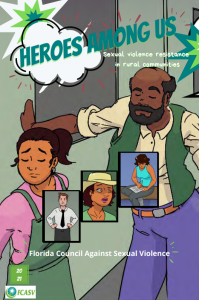Resources Library: Population-Specific Response
Start a Search:
From Hurt to Hope: A Child Sexual Abuse/Assault Advocacy Guide
From Hurt to Hope: A Child Sexual Abuse/Assault Advocacy Guide: A guide from WCSAP (Washington Coalition of Sexual Assault Programs) that provides foundational knowledge of best practices for advocates working with youth and their caregivers. The guide includes an overview of Child sexual Abuse/assault, general advocacy, medical advocacy, legal advocacy, system's coordination, information and referral, and crisis intervention.
Health Issues Affecting Trafficked Individuals
Summarizes the health issues affecting trafficked individuals. Includes information on these topics:
Considerations about status and legal proceedings: How individuals and their health problems are treated will depend on where arrested trafficked individuals are located and what kind of evidence is required for legal proceedings.
Health Problems: Health problems affecting trafficked individuals forced into commercial sex work and/or involuntary labor can be contracted because of the conditions in unsafe immigration routes utilized by traffickers and those in sending or receiving countries. Socio-economic determinants like substandard housing, illiteracy, racism, etc., affect health and access to healthcare.
Complex Traumas and Oppressions
Healthcare Providers
Medical Records and Care
Heroes Among Us Comic Book

The Florida Council Against Sexual Violence developed a creative tool for Latinx communities in rural areas while adhering to the social distance recommendations issued by health experts due to COVID-19.
You can also review a short recorded video webinar explaining what it is and providing more information about how people might use it. You can access the recording here.
High Risk Screening for Women of Childbearing Age
This handout was provided by Martha Kurgans, from the Department of Behavioral Health and Developmental Services, at the workshop titled "How Community Service Boards and Domestic Violence Programs Can Help Each Other" at the Virginia Department of Social Services Office of Family Violence Promising Practices conference on September 16, 2013.
Highlights from the Revised FVPSA Regulations for Advocates and Programs Serving LGBTQ Survivors
Revised rules and regulations regarding the FVPSA program have taken effect.
The Family Violence Prevention and Services Act program provides federal funds to states for distribution to DV and SA programs. Most DV programs receiving state funds also receive FVPSA funds. The FVPSA regulations set forth important parameters, limits and requirements for FVPSA funded programs. These regulations impact survivors on a day to day level.
FVPSA program office undertook a careful and collaborative process of updating regulations to reflect what the field has learned about the needs and realities of DV survivors as well as the DV movement’s and Federal Government’s commitment to meaningful and accessible services for DV survivors and their children.
Changes include improvements and clarifications related to access to DV advocacy and shelter for LGBTQ survivors.

